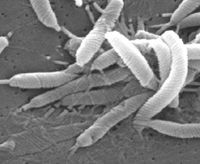Discovery of H. pylori and its role in gastric and peptic ulcer disease
 The Nobel Prize in Physiology or Medicine 2005 was awarded jointly to Barry J. Marshall and J. Robin Warren for their discovery of the bacterium Helicobacter pylori and its role in gastritis and peptic ulcer disease.
The Nobel Prize in Physiology or Medicine 2005 was awarded jointly to Barry J. Marshall and J. Robin Warren for their discovery of the bacterium Helicobacter pylori and its role in gastritis and peptic ulcer disease.
When Helicobacter pylori was discovered in 1982, the causes of peptic ulcer were considered to be stress and lifestyle. Australian pathologist Robin Warren noticed that around 50% of biopsies taken from peptic ulcer patients had colonies of particular bacteria in the antrum. A young clinical researcher, Barry Marshall, became interested in Warren’s findings and together they began an extensive study of patient biopsies. Eventually, Marshall grew a successful culture of the spiral shaped, gram negative bacterium found in the patient biopsies. The new bacterium was later designated H. pylori.
Further patient studies showed H. pylori was present in almost all patients with gastric inflammation, gastric ulcer or duodenal ulcer. To show that the inflammation was caused by H. pylori, they followed Koch’s fourth postulate: replication of the disease in an animal model using the proposed infectious agent. However, the introduction of H pylori into the stomachs of piglets led to no changes in the biopsies. They considered the experiments a failure and the results were never published.
In the absence of a suitable animal model, Marshall carried out the experiment on himself; he drank the live H. pylori culture. When he suffered severe inflammation of the stomach, a clear link between the infection with H. pylori and the development of peptic ulcer disease was finally shown. Warren and Marshall went on to show that peptic ulcers could be cured through the elimination of H. pylori with antibiotics.
The bacteria can also cause stomach cancer in some individuals, although people vary greatly in their susceptibility to the disease. Warren and Marshall’s discovery that peptic ulcers are caused by an infectious disease allowed the cure of a major cause of sickness and death in young, otherwise healthy adults.
The Mongolian gerbil has now been established as an animal model for gastric inflammation, and has susceptibility to the conditions caused by H. pylori in humans.
Further reading
http://www.nobelprize.org/nobel_prizes/medicine/laureates/2005/press.html
http://discovermagazine.com/2010/mar/07-dr-drank-broth-gave-ulcer-solved-medical-mystery#.Uh9I1Rsm3hc
http://www.thelancet.com/journals/lancet/article/PIIS0140-6736(05)67587-3/fulltext
Last edited: 11 November 2014 14:58
